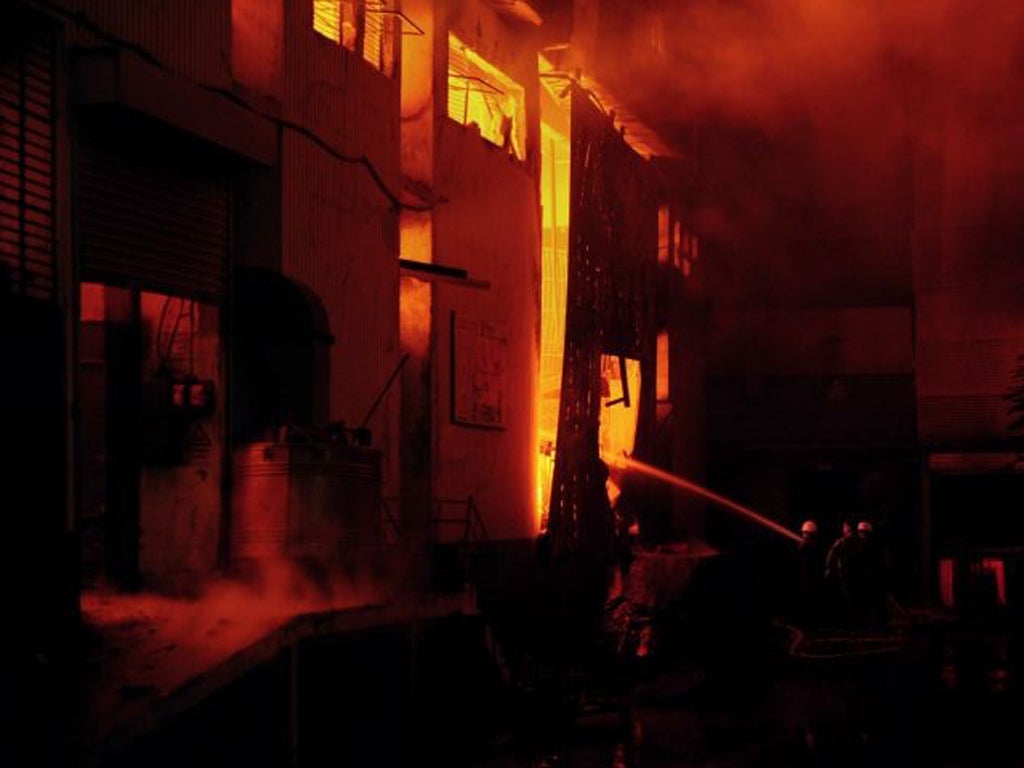Pakistan PM at centre of allegations over dropped Karachi factory fire murder charges

Your support helps us to tell the story
From reproductive rights to climate change to Big Tech, The Independent is on the ground when the story is developing. Whether it's investigating the financials of Elon Musk's pro-Trump PAC or producing our latest documentary, 'The A Word', which shines a light on the American women fighting for reproductive rights, we know how important it is to parse out the facts from the messaging.
At such a critical moment in US history, we need reporters on the ground. Your donation allows us to keep sending journalists to speak to both sides of the story.
The Independent is trusted by Americans across the entire political spectrum. And unlike many other quality news outlets, we choose not to lock Americans out of our reporting and analysis with paywalls. We believe quality journalism should be available to everyone, paid for by those who can afford it.
Your support makes all the difference.The prime minister of Pakistan is again at the centre of controversy – this time over allegations that he instructed officials to drop murder charges against the owner of a Karachi factory where 259 people died in a fire.
Various reports claimed that Raja Pervaiz Ashraf had intervened to have the charges against the owners of the factory changed, with the central charge of murder left out.
In a recent speech before business leaders in Karachi he expressed his concern that the factory owners, brother Arshad and Shahid Bhaila, were facing murder charges, simply because they owned the textile plant.
In the days after the speech, prosecutors announced that they were amending the charges to remove the allegation of intentional murder, a charge that carries with it the potential for the death penalty.
The allegations have caused outrage among the relatives of the low-paid employees who died in the September 11 2012 fire and activists who are campaigning for better and safer conditions for factory workers. Senior members of Mr Ashraf’s own Pakistan Peoples Party (PPP) raised the issue in the parliament. They have suggested the prime minister may have been influenced to act at the request of another minister.
“I am shocked to hear that a prime minister from a party such as PPP has directed [the prosecutors to remove the murder charge] against the factory owners. This is not acceptable, at least to me,” said senior politician Raza Rabbani.
Mr Ashraf’s office could not be contacted today. However, his spokesman, Shafqat Jalil, told the Express Tribune newspaper that the premier had not wanted the charges dropped but he had asked a senior official in the provincial government simply to examine whether the factory owners had been falsely implicated.
“I have no authority to withdraw the charges levelled against them, but I will ask the Sindh chief secretary and police to reinvestigate the legal aspect of the case, before referring it to the court for a further decision,” Mr Ashraf said, according to a statement released by his spokesman. “The government would not tolerate anyone being harassed.”
Around 300 people were killed last September when fires swept through factories in Karachi and Lahore within hours of each other. At the time, Francesco D’Ovidio, country director of the International Labour Organisation, a UN body, told The Independent there had not been regular industrial inspections for the last 10 years.
“Many factories are scattered, many are not registered,” he added. "The country has so few industrial inspectors.”
As it was, the factory in Karachi had been certified safe shortly before the fire took place and despite reports that many of its windows were heavily barred, preventing workers from escaping once the flames took hold. Another of other exits were also reportedly blocked.
Among those campaigning to improve safety standards in Pakistani factory is the British group Labour Behind the Label, based in Bristol. Its director Samantha Maher this week descried the effort to withdraw the murder charges against the brothers.
“It is the constitutional responsibility of the state to protect and safeguard the right to life of all citizens on an equal footing,” she said.
Last week, Pakistan's supreme court ordered that Mr Ashraf be arrested over corruption allegations dating back to his time as a minister in 2010. A federal investigation body responded by saying their was insufficient evidence to pursue the prime minister.
Join our commenting forum
Join thought-provoking conversations, follow other Independent readers and see their replies
Comments